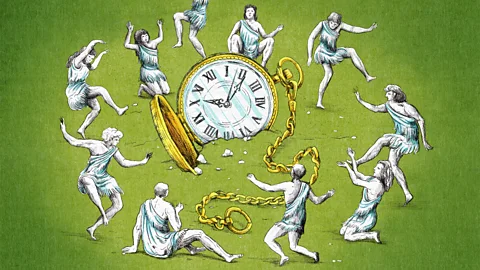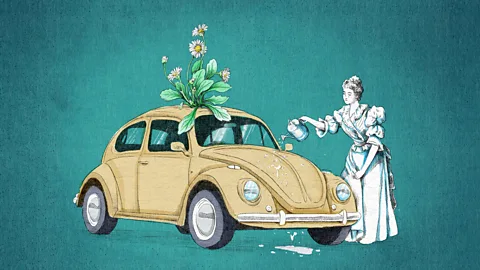The secret to long-lasting connection? Shared rituals
 Emmanuel Lafont
Emmanuel LafontMichael Norton has spent decades studying why human relationships last. Sharing rituals – from a clink of a glass to Christmas Day traditions – have a powerful positive effect.
From the games we play over the holiday season to the elaborate ceremonies that mark someone's passing, our lives are punctuated by rituals.
Michael Norton, a professor of business administration at Harvard Business School has spent years surveying people about these behaviours and the ways they shape their thoughts, feelings and relationships, culminating in his recent book The Ritual Effect: From Habit to Ritual, Harness the Surprising Power of Everyday Actions.
He spoke to science writer David Robson about the differences between rituals and habits, and their power to strengthen our relationships with friends, family members, colleagues and lovers.
What inspired you to investigate rituals?
About 10 years ago, I co-wrote a book with Elizabeth Dunn [at the University of British Columbia] on money and happiness. And the idea in that book was what little daily things you could do with $5 or £5 that could make a difference in your happiness. And I started thinking about other things in daily life that might impact our happiness. One of the things that kept coming up was people's daily rituals.
Some people might think they're too rational for rituals.
For sure, there are "ritual sceptics" and I was certainly one before I started studying them, because they do seem a little touchy-feely. But we've all done them at some point or another. They're so ubiquitous in our lives – from what we do in the morning, to graduating or getting married. We can't escape them.
What's the difference between a ritual and a habit?
A ritual is a sequence of actions that [are] meaningful to you. Habits are important, but they're not quite as emotional as rituals.
We might ask someone what they do in the morning, and they might say that they have a coffee and look at the newspaper, but they don't really care. But someone else will do those things at very specific times, and if you asked them to change it, that would make them very upset. That's a ritual.
You've now studied thousands of people's rituals. What stands out?
When I started researching rituals, I thought I was going to be studying the big kind like weddings and funerals and graduation – these really big moments. But the ones that really started to stand out are the little idiosyncratic ones that people came up with themselves. When we were studying loss, a woman said that she washed her late husband's car every weekend the way he used to. And there's so much in her saying that about her spouse, and why she's doing it, and what he cared about and how she cares about him. I mean, you can go to a car wash – it's not inherently a huge thing, but clearly, for her, she's honouring something that's important.
The other one that I love comes from a couple who said that before they eat, they clink their silverware together. To me it's striking because silverware is boring – we literally use it to put things in our mouth – but they just took these boring things that we take for granted and with these little clinks, turn it into something that's a reflection of them. They've been doing it for years, and they're going to keep doing it for years. The tiniest action has all this meaning in it.
 Emmanuel Lafont
Emmanuel LafontWhy did we evolve this behaviour? What are the benefits of rituals?
You might imagine that whenever you do a ritual, it makes you feel the same thing, but they have different effects across different domains. It seems like we use them to produce the emotion that we're looking for in a given situation. If we're out for drinks and clinking glasses, we're using the ritual to bring us together as a group, to enhance the experience. But we wouldn't do the same thing at a funeral, when we want to find peace.
Even in the domain of sports, some athletes use rituals to get amped up, while others use them to calm down. It might be exact same thing that they're using, and they're going in opposite directions with it, depending on what they're looking for in that moment.
What's the role of family rituals during the holiday season?
We have an image of what a holiday like Thanksgiving or Christmas will be like, but if you dive into it, each family does it in their own way. It might be that our great grandfather liked mincemeat pies, and now that's been built into our ritual. Whether you have family rituals is a huge predictor of whether you still get together with your family at this time of year: it's a very strong signal of how you feel about them.
I teach undergraduates, and often they won't travel all the way home for Thanksgiving, so they might go to a Thanksgiving with a friend instead. When they come back, I'll ask them what it was like – and almost to a person, they'll say that [their friend's family] was doing it wrong. It's because families use things to define themselves.
What do we know about the importance of rituals in romantic relationships?
You can ask couples, do you have any rituals? And how happy are you in your relationship? And there is a very strong link. People who say that "we have a little thing that we do", they tend to report higher relationship satisfaction, and people who say "no, we don't have anything like that".
When you break up with somebody, they're allowed to date other people, but they are not allowed to recycle your rituals! If we ask people, "How outraged would you be at your ex getting married?" nobody likes it, but the idea that you would reuse our cute little phrase, that's the thing that's a huge violation of our relationship. You can see how important these little things are in establishing bonds between us.
Friendship special
Amid the loneliness epidemic blighting many parts of the world following the pandemic, the BBC looks at how friendships can enrich our lives – and the science-backed ways to boost our social connections:
I guess also, it wouldn't be very flattering to your new partner, either, if they discovered that this ritual was something that you shared with multiple other people.
I thought exactly that, but since the book has come out, I've found are two camps of people. The bigger camp is like you and I, who say, if the new person found out it was recycled, they'd be mad too. But there's a tiny camp of people who say, if the new person found out it was recycled, it really shows that your partner is completely over their ex.
It does have its own logic, I guess.
If I refuse to go to a restaurant that was important in my previous relationship, it may be because I'm still in love with the person, but if I go out there with my new partner, maybe it's like an exorcism, and it shows that I'm really over my previous partner.
How about our coworkers? Is it important to have rituals in the workplace?
When I talk to a company about rituals, the number one thing the managers say is, "Can you give us a ritual that we can make our employees do that will make them happy and productive?" And the number one thing that all employees do when they hear about rituals is roll their eyes.
It's an important distinction, because when we ask teams at work, they very rarely report something that was imposed upon them. What they report are ones they came up with themselves, like rituals around lunch, rituals around people's birthdays and things like that. And if you have a ritual with your team, you're much more likely to find meaning in the work that you do with that team.
* Michael Norton's new book The Ritual Effect: From Habit to Ritual, Harness the Surprising Power of Everyday Actions is published by Scribner (USA)/Penguin Life (UK)
* David Robson is an award-winning science writer and author. His latest book, The Laws of Connection: 13 Social Strategies That Will Transform Your Life, was published by Canongate (UK) and Pegasus Books (USA & Canada) in June 2024. He is @davidarobson on Instagram and Threads.
--
If you liked this story, sign up for The Essential List newsletter – a handpicked selection of features, videos and can't-miss news, delivered to your inbox twice a week.
For more science, technology, environment and health stories from the BBC, follow us on Facebook, X and Instagram.
